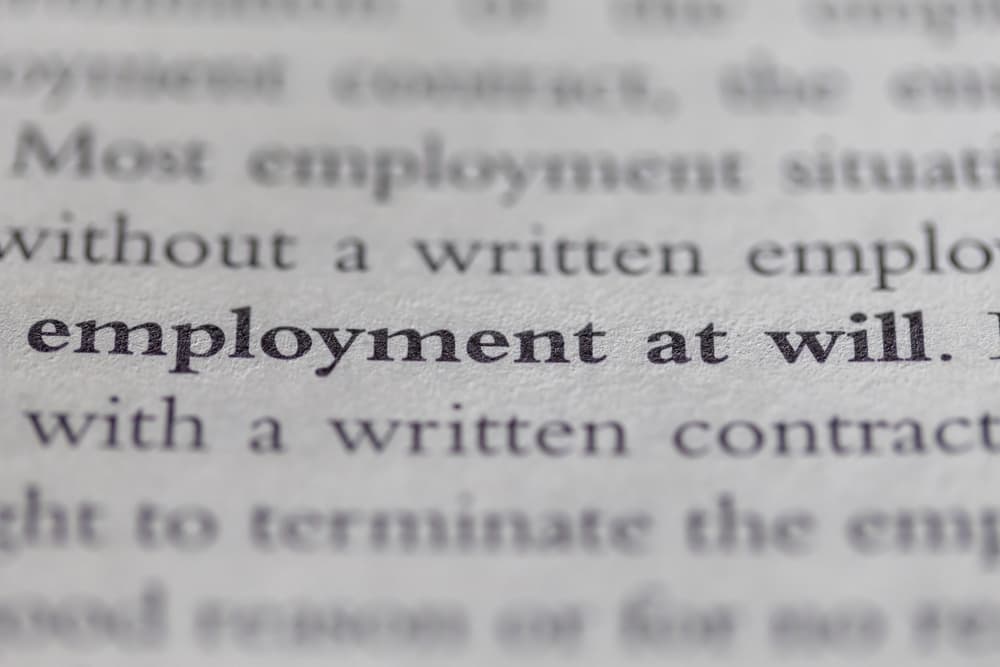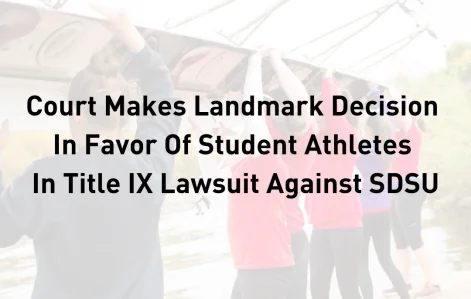Demotions and wrongful termination happen every day in every state in America for many reasons, including reporting discrimination. Unfortunately, employees frequently don’t exercise their rights when it comes to the illegal actions of their former employers.
Essentially, your employer can fire you for nearly anything, as most states have at-will employment—but they can’t fire you for everything.
With the help of an experienced wrongful termination lawyer in San Diego, employees can hold these employers accountable for their illegal actions under state and federal laws.
Schedule a Free Case Evaluation Today!
What Is Wrongful Termination?
An employer has extensive discretion in terminating an employee. Even still, many terminations break state or federal laws, such as those against discrimination or retaliation.
Wrongful termination happens if an employer fires, dismisses, or forces an employee to quit in violation of any state or federal law or public policy or if the employer violates an existing agreement between the employee and the employer.
A wrongfully terminated employee is entitled to damages for past and future lost income and benefits, emotional distress, and possibly others.
Being let go from a job may constitute wrongful termination if:
- Your termination involved discrimination – You lost your job due to your disability, race, age, religion, ethnicity, sexual orientation, sex/gender, medical condition, or other protected categories, which is a violation of your state and federal legal rights.
- Your employer retaliated against you for exercising your rights – You were fired after making a report or complaint regarding workplace wrongdoing or illegal conduct or after standing up for your protected rights.
Discrimination: Grounds for Wrongful Termination
Although employers may legally dismiss employees from their jobs for no reason (“at will” employment), it’s against federal and state laws to fire an employee due to their race, gender, ethnicity, country of origin, sexual orientation, age, and/or disability.
When an employer illegally terminates an employee, the employee:
- Likely has a valid wrongful termination claim
- Can file an official complaint with the Equal Employment Opportunity Commission (EEOC)
- Should hire a wrongful termination lawyer to help protect their rights and pursue compensation for their damages
Retaliation Against Employees for Exercising Their Rights: Grounds for Wrongful Termination
In most states, employees have particular workplace rights, including the right to:
- Privacy
- A safe work environment
- To blow the whistle on the illegal actions of an employer
- Exercise their whistleblowing rights by reporting an employer to OSHA or some other authority for their law violations
Suppose an employer demotes or fires an employee for exercising their rights under the law or in retaliation for blowing the whistle on some violation, such as a safety issue. In that case, the employee likely has a valid wrongful termination claim and can file a lawsuit against their employer for several different kinds of damages.
At-Will”Doesn’t Mean No Rules
The concept of at-will employment means an employee can be terminated at any time and for any or even for no reason, as long as the reason for the termination isn’t illegal. So, even though your employer has many reasons they can fire you, they can’t fire you for a few specific illegal reasons.
Does At Will Employment Mean My Employer Can Fire Me at Any Time for No Reason?

Generally speaking, at-will employment does mean that your employer can fire you at any time for no reason at all. They can also fire you for some reasons—because they thought you were rude toward them, another employee, or a customer, because you failed to perform to their standards, because you broke the dress code, or didn’t adhere to another company policy. They can dismiss you because they don’t like the way you park your car or that you eat a salad every day for lunch.
Are those reasons a bit over the top? To most people, yes. Are they illegal? No.
However, what your employer can’t do is demote or fire you as an act of discrimination under a protected class or characteristic because you blew the whistle on wrongdoing in the workplace or because you exercised another employee’s right under the law, such as taking FMLA leave or filing a worker’s compensation claim.
Why is Employment At-Will Important in Wrongful Termination Cases?
Unfortunately, many employers who wrongfully terminate their employees hide their true actions behind the disguise of employment-at-will law. They will give no reason for letting the employee go, or they will say that business is down and the employee’s position is no longer necessary.
But in reality, they fire an employee for some other and illegal reason—such as they don’t like their race or gender, that they are pregnant, or that the employee blew the whistle on their illegal actions, including reporting discrimination.
Making the differentiation between at-will and illegal is crucial in wrongful termination cases. Employers know when they fire employees for unlawful reasons and will take significant steps to hide their true intentions. It takes a seasoned wrongful termination lawyer to uncover evidence supporting a wrongful termination claim.
Wrongful Termination for Retaliatory Reasons
Employees are protected under federal and state laws if they decide to report wrongdoing. They can stand up for their rights and the rights of others without fearing termination or even other adverse employment events.
It’s illegal for businesses to fire employees for complaining about or reporting:
- Discrimination
- Sexual harassment or other illegal harassing behaviors
- Unsafe working conditions
- Violations to either a law enforcement agency, government authority, or someone in the company with the authority to investigate and fix the violation
You use the same standard as discriminatory wrongful termination and proving retaliatory wrongful termination. Usually, the most compelling evidence in retaliation claims is various events that can establish a direct connection between an employee’s complaint and termination.
However, just as with discrimination-based termination, other convincing evidence in retaliation cases includes inconsistencies or flaws in the employer’s purported non-retaliatory termination reason or the employer ignoring its own internal policies and procedures regarding behavior correction and termination.
How to Fight Wrongful Termination
Employees victims have several options when it comes to fighting wrongful termination.
First, they can file a complaint with the applicable government agency, such as the Equal Employment Opportunity Commission (EEOC) and their state’s equivalent government agency. With a thorough investigation and application of state law, the employee may have a successful wrongful termination lawsuit.
An experienced wrongful termination attorney can assess your situation and make recommendations based on:
- How long you worked for the company
- Your performance based on positive evaluations, promotions, salary raises, and bonuses
- Current company policies, either written or oral, describing disciplinary and termination procedures
- Other pertinent measures
Once they make a determination, your attorney can take the next steps toward protecting your rights and pursuing compensation.
What Compensation Can I Receive from a Successful Demotion or Wrongful Termination Lawsuit?
In a successful wrongful termination case, you may seek compensation for:
- Lost income
- Benefits
- Other damages, including emotional distress
- Punitive damages
The kinds of compensation you may be entitled to depend on the specific details of your case and the harm you suffer due to your wrongful termination. Each case is different, so it’s essential to speak to a wrongful termination lawyer to determine what your case can be worth.
When Should You Hire a Wrongful Termination Attorney?
If you suspect you were wrongfully or illegally let go from your job, don’t wait to contact a wrongful termination attorney. The sooner you hire a lawyer, the sooner they can collect evidence to support your claim and protect your rights.
Employers can destroy, lose, or hide evidence. Call a lawyer to collect and preserve it as soon as possible.
In addition, your legal rights after a wrongful termination have expiration dates. If you don’t exercise them within the given deadline, you cannot exercise them at all. So, contact a wrongful termination lawyer as soon as possible.
Do You Have a Valid Discrimination Claim?
Suppose you have recently been fired from your job or experienced any other negative employment actions, and you are a member of a legally protected class. In that case, you might wonder if you have a discrimination claim.
The best way to determine this is to meet with an attorney who is well-versed in your state’s workplace discrimination claims.
Discrimination comes in many different forms, all of which are violations of employees’ rights and can be related to other protected personal characteristics under state and federal laws.
The most common legal claims for discrimination arising from the following characteristics:
- Gender
- Sex
- Pregnancy, including medical conditions related to pregnancy or childbirth
- Age—employees aged 40 and over are protected from different treatment or being forced out of work due to their age
- Race/national origin
- Religion
- Sexual orientation
- Marital status
- Disability— employers must provide their employees who have a physical or mental disability, either short-term or long-term, with reasonable accommodations. They must also engage in good faith discussions with these employees to identify together what accommodations are necessary.
Specific negative employment actions that reveal discrimination can include:
- A demotion
- Failure to hire
- Unfavorable transfer or job assignment
- Denial of promotion or advancement
- A decrease in pay or reduction of benefits or employment-related perks
- Being forced to quit
- Termination or firing
- Any other adverse decision that significantly affects the terms and conditions of employment
What Should I Do if I Believe I Have Been the Victim of Employment Discrimination?
If you believe you are a victim of employment discrimination, report the incident to your employer right away and ensure you document any relevant evidence, including emails, notes, or witness statements.
You may file a formal complaint with the Equal Employment Opportunity Commission (EEOC) or a related state agency. In addition, a seasoned employment discrimination attorney can handle the employment discrimination complaint process and be your steady advocate.
Can I File a Complaint While Still Employed?
Even if you are still employed, you have the right to file an employment discrimination complaint.
Unfortunately, some employers will retaliate against employees who take such actions. For instance, after making a report, you might be fired, demoted, or given a less desirable client or work schedule. As such, hire a discrimination attorney to file your complaint.
After you file a complaint with the EEOC, it’s their job to complete a thorough investigation regarding your allegations. If the agency finds adequate evidence to support your complaint, it can attempt to settle the complaint between you and your employer. If they fail, the EEOC can file a lawsuit on your behalf. An experienced lawyer can explain this process and what is involved.
Damages in an Employment Discrimination Case
Similar to a wrongful termination case, if your employment discrimination case is successful, you may recover compensation for several damages, such as the following:
- Back pay
- Front pay
- Lost benefits
- Emotional distress damages
Depending on the specifics of your case, you may also be entitled to attorney’s fees and other costs associated with your workplace discrimination claim.
Speak With a Wrongful Termination Lawyer Today and Find Out if You Have a Case

Don’t procrastinate when it comes to your legal rights. Instead, contact a skilled wrongful termination lawyer today. An employment law attorney can tell you if you have a valid claim, get your case started, and support you every step of the way.
This is a difficult situation, and you need an objective legal professional representing you from the beginning of the process until you receive justice from your former employer.





